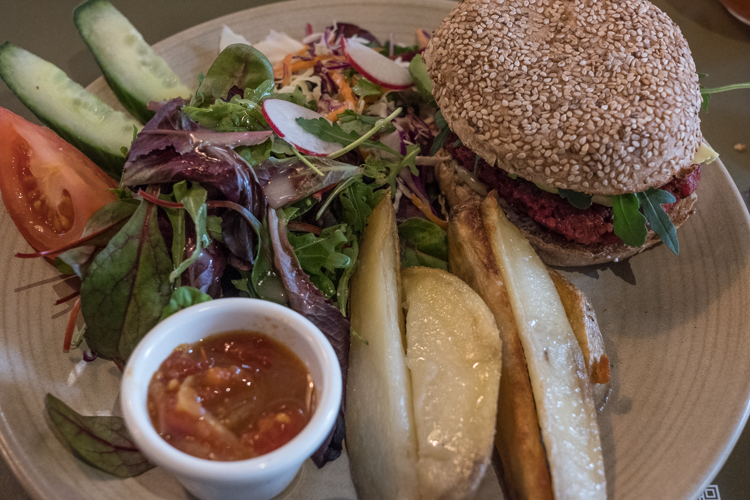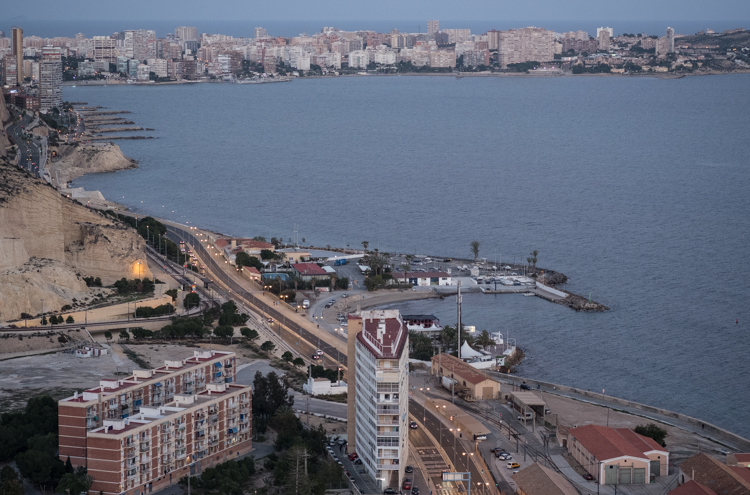This is the first weekly blog of the new year. On New Year’s Day my wife flew off to visit her family in Puerto Rico, so I spent the week with my daughter who was here until Saturday the 7th, just doing peaceful things, cycling and generally relaxing.
1_1
Walking Cheeta on New Year’s Day, I photographed these remnants from the night before. In general though, there is far less NYE fireworks in Spain than in the other countries where I have lived:

1_2
Later in the morning, I drove my wife to the airport. It appeared that the lottery vendor had had a long night too:

1_3
Continuing with the sleeping theme, after I came home from my bicycle ride later in the day, I found Cheeta not exactly guarding the house. She has definitely retired from guard dog duty:

1_4

1_5

1_6
The following day started out cloudy:

1_7
One of “my” cats:

1_8
That evening, I made one of my (and Monica’s) favourite dishes for dinner. It is a Turkish dish called “the imam who fainted” because according to legend an imam to whom the dish was served was so delighted that he fainted. Basically, you take some aubergines, bake them, scoop out the flesh and sauté it with onions, garlic and spices, put it back in and bake some more. Simple, delicious and vegan:

1_9
On January 3rd, I took Monica and one of her high school friends, Daniel, for lunch at Moments. This is the depth of winter, but it was warm enough to eat outside:

1_10
We enjoyed out food and looking at looking at the beach promenade traffic:

1_11
Some of the natives found the weather cold anyway:

1_12
Mother and daughter, communicating:

1_13
The sunrise on January 4th, on my kitchen terrace:

1_14
In the afternoon, we went to visit the pet memorial tree. Monica saw it for the first time and loved it:

1_15
A picture from my bike ride on January 5th–the invasion of Spain by northern Europeans:

1_16
On January 6th, I had some really nice clouds during my morning ride. This is Playa Muchavista in colour:

1_17
…and in B&W:

1_18
A bit later, I photographed the landscape near Busot, again in colour:

1_19
…and again, in B&W:

1_20
In the afternoon, we went for a walkabout in the city. Near the hospital where I had hernia surgery 7 years ago, we “discovered” a statue that we had not seen before. Monica came up with a brilliant pose:

1_21
A wall artist at work in the barrio:

1_22
We went for lunch at Bodhigreen, an excellent vegetarian restaurant. This is my main course, a veggie burger called Hippie Dream. With food like this, you do not need meat at all:

1_23
Afterwards, we stopped at a veggie bakery called Tres Semillas to buy some dessert for the evening’s dinner. Monica was happy to learn that everything was vegan and took a picture to post on Facebook:

1_24
On the way back to the car, Monica asked to be photographed with this sign. This is the last picture of her during this visit, as she was flying back to Cardiff early the next day:

1_25
Early Saturday morning, I took Monica to the airport, then went for a short bike ride, just 50 km, as I had a bad cold. After lunch, I went to the archeological museum of Alicante to see an exhibition about the Vikins, mounted in cooperation with the National Museum of Denmark. At the entrance, there is a film introducing the exotic subject to the Spanish audience:

1_26
Of course, transporting the actual Viking ships from Denmark to Alicante was not possible, but the size was indicated on the floor of the exhibition hall:

1_27
This a supporting pillar of a bridge in Denmark, built 1200 years ago. I found it almost emotional to be able to touch it:

1_28
This, for me, was the main part of the exhibition. The stone displayed in this hall is called the Jelling Stone. It was raised by king Harald Blåtand (Harald Bluetooth) in 965. He was the first king of unified Denmark, and the stone is considered as Denmark’s “birth certificate”. The current queen Margrethe II can trace her roots to Harald Blåtand and his father Gorm den Gamle (Gorm the Old):

1_29
The Jelling Stone has three faces. One of them depics a mythical beast from Nordic mythology. This image is reproduced in the upper right corner of the odd-numbered pages in a Danish passport:

1_30
In addition to unifying Denmark, Harald Blåtand also made it Christian. The Vikings came into contact with Christianity while pillaging and raiding countries like France. During the 9th century, Christian monks came to Scandinavia, the last bastion in Europe of pagan religion, and little by little they succeeded. King Harald placed an image of Jesus on the Jelling Stone. This image is on the inside front cover of my Danish passport:

1_31
The third side of the stone contains the runes. For those who are not up to speed on those, here is the translation: “King Haraldr ordered this monument made in memory of Gormr, his father, and in memory of Thyrvé, his mother; that Haraldr who won for himself all of Denmark and Norway and made the Danes Christian.”

1_32
Afterwards, as the sun was setting, I drove up to the nearby Castillo Santa Barbara, a Moorish castle on a hill overlooking Alicante, to have a look at the city from up high. This is Alicante harbour:

1_33
This is my way home from work:

1_34
Birds, seen one way:

1_35
Same birds, seen another way:
